In the realm of canine dietary considerations, the query of whether dogs can safely consume cabbage has piqued the interest of many pet owners seeking to provide a well-rounded diet for their furry companions.
As the discussion turns to the potential advantages and drawbacks of integrating this cruciferous vegetable into a dog's nutrition regimen, insights from veterinary professionals shed light on the matter. By uncovering the recommendations, precautions, and appropriate preparation techniques endorsed by veterinarians, dog owners can navigate this aspect of pet nutrition with prudence and care.
Through an exploration of the evidence-backed guidance provided by experts in the field, a clearer understanding emerges, guiding responsible decision-making in the realm of canine health and dietary practices.
Key Takeaways
- Introduce cabbage gradually, offer cooked over raw, and avoid seasonings.
- Consult a vet before adding cabbage to your dog's diet.
- Choose from various cooked cabbage types and incorporate other safe fruits/vegetables.
- Feed cabbage occasionally in small amounts to prevent potential digestive issues.
Health Benefits of Cabbage for Dogs
Cabbage offers valuable nutrients and vitamins that can be beneficial for the overall health of dogs. Rich in vitamin C, K, magnesium, and beta-carotene, cabbage provides essential nutrients while being low in calories and high in fiber. These components support a healthy digestive system and contribute to a dog's overall well-being.
However, it is crucial to introduce cabbage gradually into a dog's diet to avoid digestive issues such as gas, commonly caused by its fiber content. Additionally, the presence of thiocyanate in cabbage can potentially impact the thyroid gland, necessitating moderation in feeding. By offering cabbage occasionally and in small amounts, pet owners can harness the nutritional benefits of this vegetable while minimizing any associated risks.
Nutritional Value and Risks
Incorporating cabbage into a dog's diet entails considering both its nutritional value and potential risks. Cabbage is a beneficial addition to a dog's diet as it is low in calories, high in fiber, and packed with essential nutrients such as vitamin C, K, magnesium, and beta-carotene.
However, it is important to be cautious as cabbage can cause gas due to its fiber and raffinose content. Additionally, thiocyanate present in cabbage can potentially affect the thyroid gland in dogs. To mitigate these risks, it is advisable to offer cabbage to dogs occasionally and in small amounts.
Consulting with a veterinarian before introducing cabbage to your dog's diet can help ensure a safe and balanced nutritional intake.
Introducing Cabbage to Your Dog
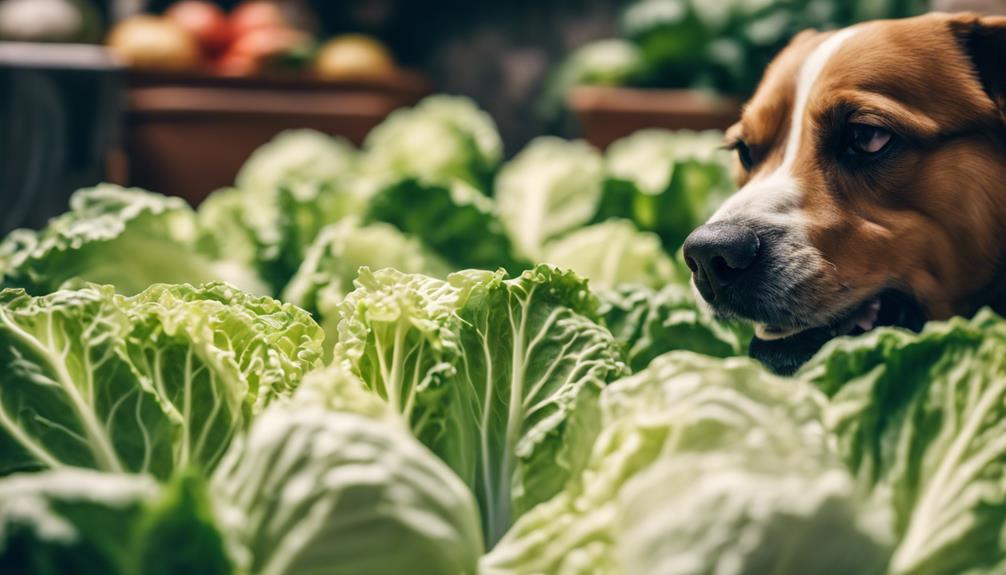
When considering introducing cabbage to your dog, it is crucial to understand the importance of a gradual and cautious approach to ensure your pet's well-being and digestive health.
Begin by offering small amounts of cooked cabbage to your dog, especially if they have not consumed it before. Monitor your dog for any signs of digestive upset or allergies.
It is advisable to consult with your veterinarian before adding cabbage to your dog's diet to ensure it aligns with their nutritional needs and any existing health conditions.
Cooking Cabbage for Canines
For optimal canine consumption, the preparation of cabbage through cooking is recommended to facilitate better digestion for dogs. Cooking cabbage helps break down its tough fibers, making it easier for dogs to digest compared to raw cabbage.
When cooking cabbage for canines, it is important to avoid seasoning and toxic foods like onions and garlic, which can be harmful to dogs. By consulting with your vet before incorporating cabbage into your dog's diet, you can ensure that it is suitable for your furry friend.
Additionally, dicing the cooked cabbage into small, manageable pieces can help prevent choking hazards and make it easier for your dog to eat.
Precautions and Recommendations
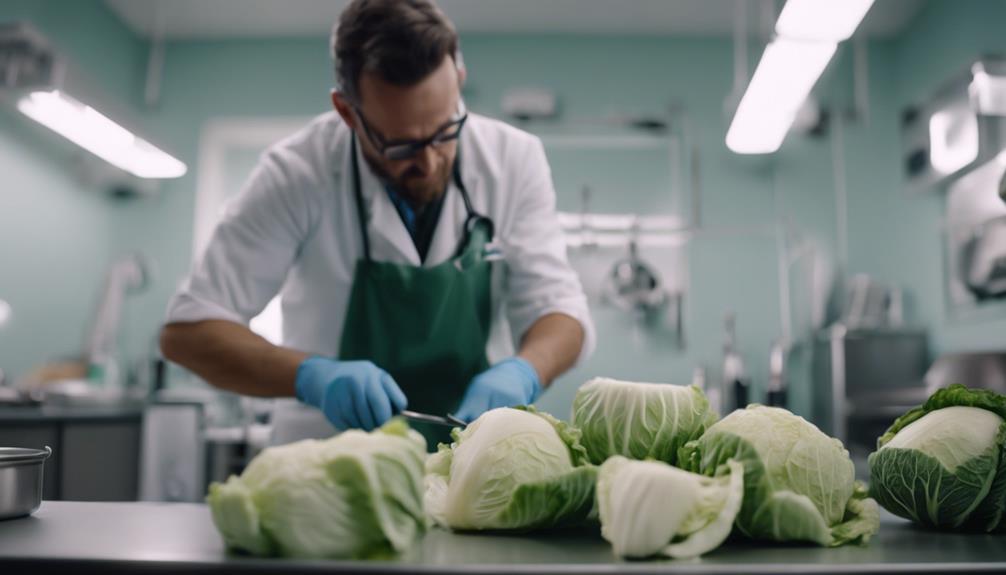
To ensure the well-being of your canine companion when introducing cabbage into their diet, it is essential to be mindful of specific precautions and recommendations. When feeding cabbage to your dog, remember to introduce it gradually to avoid any digestive upsets. Cooked cabbage is preferable over raw cabbage as it is easier for dogs to digest. Avoid adding any seasoning or toxic foods like onions and garlic when preparing cabbage for your furry friend. Consulting with your vet before incorporating cabbage into your dog's diet is always recommended. Additionally, dice cooked cabbage into small pieces to prevent any choking hazards.
| Precautions | Recommendations |
|---|---|
| Introduce gradually | Cook cabbage before feeding |
| Avoid seasoning | Consult vet beforehand |
| Dice into small pieces | Monitor for any adverse reactions |
| Monitor digestion | Feed in moderation |
| Watch for choking hazards |
Variety of Cabbage Types
The diversity of cabbage types offers a range of nutritional benefits for dogs, enriching their diet with varied nutrients and flavors. When considering the types of cabbage to include in your dog's diet, it's essential to choose options that are safe and beneficial for their health.
Here are some varieties of cabbage that can be suitable for dogs:
- Savoy Cabbage: Known for its crinkled leaves, Savoy cabbage is a mild-flavored option that can be a tasty addition to your dog's meals.
- Red Cabbage: Rich in antioxidants, red cabbage provides additional health benefits and a vibrant color to your dog's food.
- Brussels Sprouts: These miniature cabbage-like vegetables offer a crunchy texture and are packed with nutrients that can support your dog's well-being.
Adding Other Vegetables and Fruits
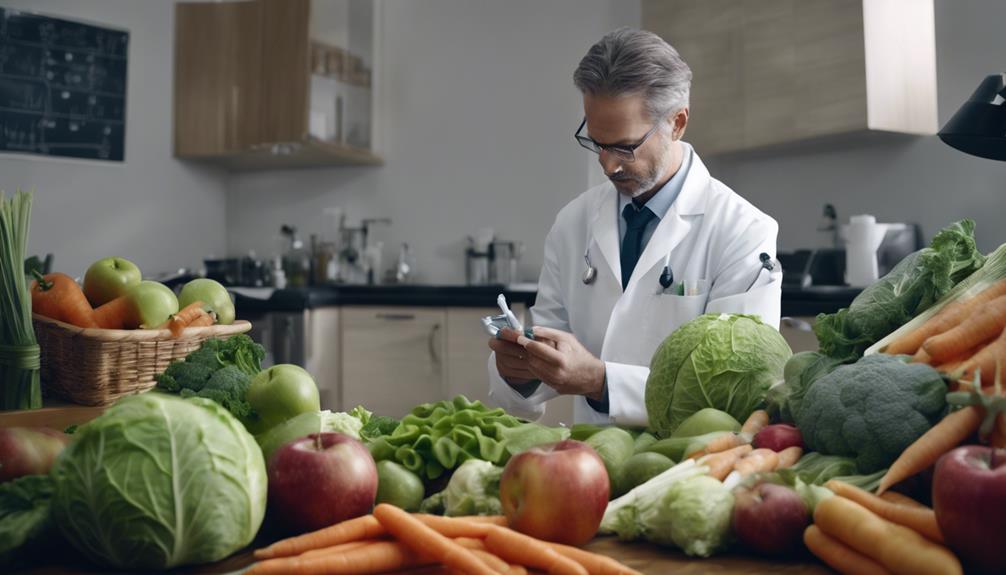
Incorporating a diverse selection of vegetables and fruits can enhance the nutritional profile of your dog's diet. Along with cabbage, other safe vegetables and fruits can be added to provide a variety of nutrients. For example, dogs can enjoy spinach and asparagus, while apples are a suitable fruit option.
It is important to offer dates cautiously due to their high sugar content. Corn can be included in moderation, and green beans, bananas (without the peel), oranges, lettuce, and potatoes can also be occasional additions to your dog's diet.
Consulting with your veterinarian for specific recommendations on incorporating plant-based snacks can help ensure a balanced and healthy diet for your furry companion.
Vet Consultation for Plant-Based Foods
Seeking guidance from a veterinarian is essential when considering plant-based foods for your canine companion's diet.
When consulting with your vet regarding plant-based foods for your dog, consider the following:
- Nutritional Needs: Veterinarians can provide insights into your dog's specific nutritional requirements and how plant-based foods can meet those needs.
- Allergies and Sensitivities: Vets can help identify any potential food allergies or sensitivities your dog may have to certain plant-based ingredients.
- Balanced Diet: Vets can advise on how to ensure a balanced diet for your dog when incorporating plant-based foods, ensuring they receive all necessary nutrients for optimal health.
Consulting with a veterinarian ensures that any dietary changes are safe and beneficial for your furry friend.
Safe Foods Beyond Cabbage
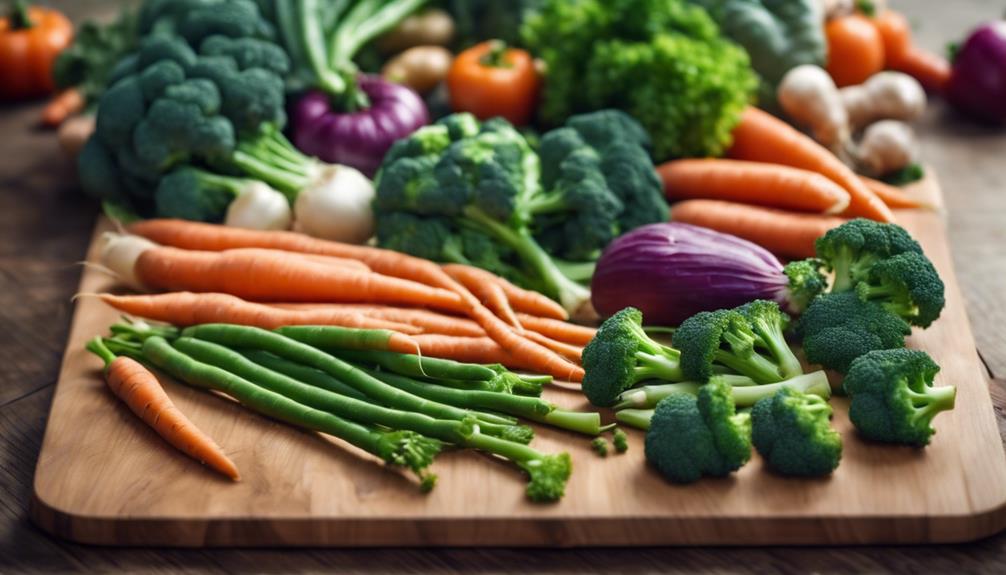
When exploring safe dietary options for dogs beyond cabbage, it is essential to consider a variety of nutritious fruits and vegetables that can complement their overall health and well-being. In addition to cabbage, dogs can enjoy a range of safe foods like spinach, apples, and green beans. Here is a table highlighting some safe food options for dogs:
| Vegetables | Fruits | Other |
|---|---|---|
| Spinach | Apples | Green beans |
| Asparagus | Oranges | Bananas |
| Lettuce | Potatoes |
These foods can provide dogs with essential vitamins, minerals, and fiber, contributing to a balanced diet when fed in moderation. Consulting a veterinarian for specific dietary recommendations is always advisable.
More Safe Food Options
Exploring additional safe food options for dogs beyond the previously mentioned choices can provide a wider range of nutritious options to enhance their diet. Here are three more safe food options for dogs:
- Sweet Potatoes: Rich in fiber, vitamins, and minerals, sweet potatoes can be a healthy addition to your dog's diet when cooked and served plain.
- Blueberries: Packed with antioxidants, blueberries can offer various health benefits to dogs and serve as a tasty treat in moderation.
- Carrots: Crunchy and low in calories, carrots are excellent for a dog's dental health and provide essential nutrients like vitamin A when given as an occasional snack.
These additional safe food options can contribute to a balanced diet for your canine companion.
Healthy Snack Choices for Dogs
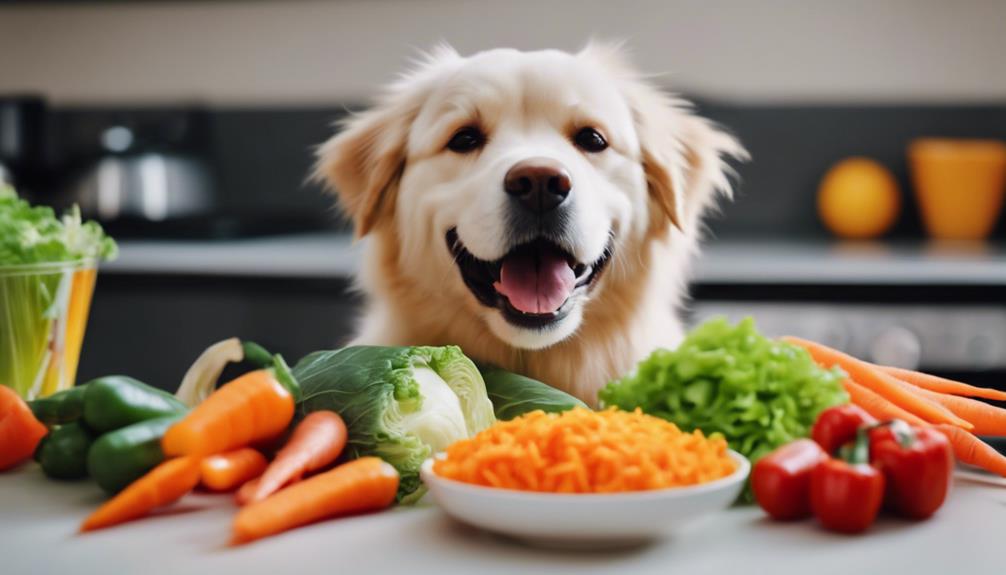
To further enhance your dog's diet with nutritious options, consider introducing healthy snack choices that can provide both enjoyment and essential nutrients for your furry companion. Opt for snacks like green beans, which are rich in vitamins and minerals while being low in calories, making them a great option for weight management.
Bananas, without the peel, offer potassium and fiber, promoting digestive health. Oranges can be a refreshing treat, packed with vitamin C. Lettuce is a safe vegetable that can add crunch to your dog's snack time. Potatoes can be included occasionally, offering carbohydrates and nutrients.
Occasional Inclusions in Dog Diet
Incorporate a variety of safe and nutritious foods in moderate amounts to diversify your dog's diet and promote overall well-being.
- Rotate Proteins: Offer different sources of lean proteins like chicken, turkey, beef, and fish to provide essential amino acids and prevent dietary imbalances.
- Include Healthy Fats: Incorporate omega-3 fatty acids from sources like salmon, sardines, or flaxseed to support skin health and immune function.
- Vary Carbohydrates: Mix in whole grains such as brown rice, quinoa, and oats alongside starchy vegetables like sweet potatoes and peas to supply energy and dietary fiber for digestive health.
Conclusion
In conclusion, incorporating cabbage into a dog's diet can provide various health benefits, but it is essential to consider potential risks and proper preparation methods.
Consulting with a veterinarian is recommended to ensure that cabbage is suitable for your dog and to receive personalized recommendations.
By following precautions and making informed choices, dog owners can offer their furry companions a diverse and nutritious diet to support their overall well-being.




